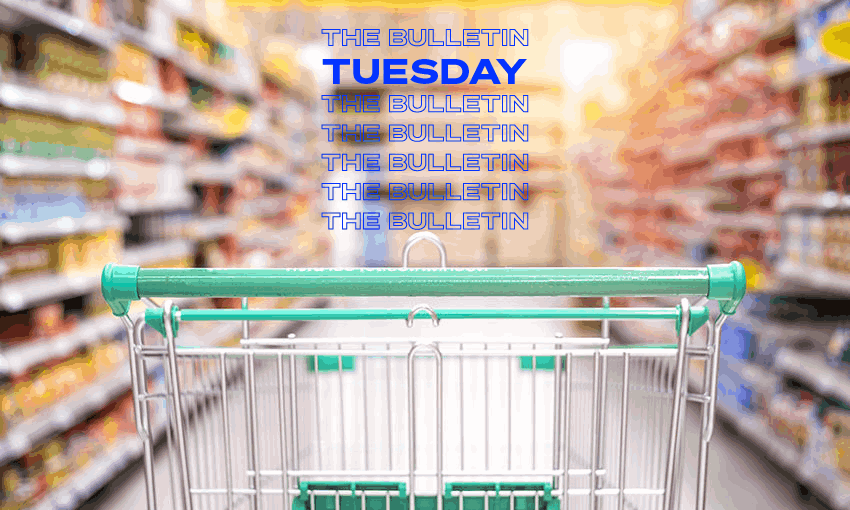Taking on the supermarket duopoly
The commerce commission report was described as “toothless”, so what options do shoppers and the government have?
Mōrena and welcome to The Bulletin for Tuesday, April 26, by Anna Rawhiti-Connell. Presented in partnership with Z Energy.
In today’s edition: Victory with caveats for Macron; Luxon v Tame; Xe variant detected in NZ but first, alternative grocery options.
Options for buying pantry staples are limited in New Zealand. (Photo: Getty Images)
A duopoly so powerful, no one would invest in an alternative
Chris Schulz has talked to Sarah Balle, founder of Supie, an online supermarket delivery start-up that operates in Auckland. Balle has been a vocal advocate for breaking the hold the current duopoly has, saying the Commerce Commission report was a missed opportunity for a reset. She struggled to find investment for her business because people thought she was crazy competing against the duopoly. Her business is growing and presents a viable alternative to shopping at the big supermarkets.
I can’t believe it’s not $6 butter
There are alternatives to supermarkets for staples but they tend to be pricey and niche, like milk delivery services or Farro. To compete on price, you need scale and equitable access to wholesalers. Balle says she’s not able to stock Mr Chips fries made from potatoes her parents grow, because of exclusivity deals with the supermarkets. Recently, the Warehouse Group has started making moves back into the grocery space. Speaking to Brianna Mcilraith at Stuff about their failure to make grocery work 16 years ago, CEO Nick Grayson said it “was down to access to products and supply chains”. Food prices are so topical right now that the Warehouse’s $4 block of butter generated headlines. The group will no doubt be keeping an eye on Costco, a wholesale giant, which is set to open in September in Auckland.
Will the government go further than the commission recommendations?
Commerce and Consumer Affairs Minister David Clark has said the government may look to go further than what was recommended by the commission. In an interview with Stuff’s Luke Malpass over the weekend, Grant Robertson has said all options are still on the table, including breaking the duopoly up. Former Labour then NZ First MP Shane Jones says doing nothing about the duopoly is “harebrained”, but he’s sceptical about the government’s ability to implement change. Doing something won’t alleviate price concerns for shoppers any time soon, but would certainly be a way to take action, against a backdrop of daily headlines like this about the prospect of vegetables being destroyed, instead of sold or actually eaten.
The value of food
This won’t make many people feel better right now but Lincoln University’s Alan Renwick argues that higher food prices might make us value food differently. He says we waste a lot of food and that removing the GST on it isn’t the answer because the cheaper food is, the more we waste. Instead, he suggests it would be better to use the extra tax funds to alleviate the financial pressure on low income households. I bake bread at home. This is no great culinary boast – it is often not great – but because I have made it, I make us eat it all anyway. It does make you think about how we’ve been led to believe that food is the product of a complicated, high-profit manufacturing, supply chain and retail process where waste is inevitable.
We are on a mission to ensure independent journalism thrives in Aotearoa. Will you help us?
Become a Spinoff member today and join a community of your fellow readers whose generous support funds our journalism and ensures we can continue bringing you powerful, original stories about the Aotearoa that was and will be.
Head over here to find out more about how you can support our mahi.
‘Grande victoire, grands défis’
Great victory, great challenges. That was the headline from France’s centre-right newspaper, Le Figaro, following Emmanuel Macron’s election win over far-right opponent Marine Le Pen. He became, on some technicalities, the first president of the Fifth Republic to win re-election. Centre-left newspaper, Le Monde, were less enthusiastic, calling it a “tepid victory”. Macron picked up 58.5% of the vote, Le Pen 41.5%, while 28.1% of people abstained from voting, close to the record high set during the 1969 election. For anyone concerned about stability in Europe, Macron’s victory will be a relief, but most global coverage is running with some strong caveats about the increase in votes for Le Pen.
Xe variant detected here, expert calls child vaccination rates ‘literally stagnant’.
The xe variant is a combination of the BA.1 and BA.2 omicron subvariants. Scientists say it could be 10% more transmissible than omicron. Michael Baker says it remains to be seen whether xe will overtake omicron as the dominant strain here. Experts have called on the government to focus on managing Covid-19 spread in schools. Computational biologist David Welch says that childhood vaccination rates are “literally stagnant” and suggests the arrival of xe could be an opportune time to do something about that. As of April 25, only 22% of children aged 5-11 are fully vaccinated.
Luxon grilled on ‘wasteful spending’ lines.
Christopher Luxon appeared on Q&A on TV 1 on Sunday and was interrogated by Jack Tame on exactly what he classifies as wasteful spending by the government. The video is now in the top five most-viewed videos of all time on Q&A’s YouTube channel. It’s worth comparing with Nicola Willis’s interview on Newshub’s The Nation on Saturday as to who was more surefooted. Luxon did land a line (which will annoy some but perhaps make him more relatable to others) saying he wasn’t “a polished career politician”. There are 18 months until the next election so perhaps getting an interview with Tame out of the way early was a good practice run.
Death of worker at Lyttelton Port.
The man was killed while loading a ship at the port on Monday morning. It comes a week after Atiroa Tuaiti died working at the Ports of Auckland, the fourth death at those ports since 2017. The Maritime Union has reiterated their calls for national health and safety standards to be implemented across the industry saying there are systemic issues. Workplace Relations and Safety Minister Michael Wood said he was not ruling out a national inquiry into ports last week.
Outcry over ban of Russian and Belarusian players from Wimbledon.
The Women’s Tennis Association (WTA) has warned Wimbledon organisers of strong reactions to their ban on players from Russia and Belarus competing at the tournament this year. The WTA says the move is discriminatory. Nine-time Wimbledon champion Martina Navratilova has backed the call saying, “Tennis is such a democratic sport. It is difficult when you see politics destroy it.” Navratilova recently criticised the WTA for its ban on “Where is Peng Shuai?” T-shirts at the Australian Open saying they were capitulating to China.
Got some feedback about The Bulletin, or anything in the news? Get in touch with me at thebulletin@thespinoff.co.nz
Naomii Seah discovers whether Auckland is really in danger of losing its architectural heritage; Rhodes scholar Rhieve Grey salutes the Māori women who got him to Oxford; and Lauren Shamy yearns for a proper British chain-shop sandwich.















Childhood vaccination rates are probably low also because all the kids got Covid and as such weren't eligible for their second vaccination when it would have been due. I do largely support this government's pathway but it does feel kids under 12 (and their whānau) were thrown under the bus so that the economy could crack on.